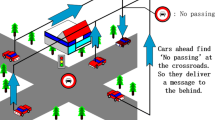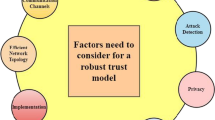Abstract
In vehicular networks, trustworthy information sharing between vehicles is an important security issue. We find that existing trust systems in vehicular networks have the disadvantages of high assessment latency and high maintenance cost. In this paper, by introducing mobile edge computing (MEC), we propose a tree-searching based trust assessment method through communities, named TTAC method, for vehicular networks. The proposed TTAC method includes two parts. First, based on information interactions, TTAC gives a direct trust assessment method by utilizing Dempster-Shafer (D-S) evidence theory. Second, with the assistance of MEC base stations, TTAC designs a tree-searching based indirect trust calculation method by utilizing two neural networks through vehicles’ communities. In experiments, we use a dataset of Shenzhen taxicab traffic and simulate information interactions among vehicles. The experimental results show that TTAC method can ensure fast calculation time with high assessment accuracy in a distributed manner. Especially, in terms of the accuracy of the indirect trust assessment, the mean square error (MSE) of TTAC method is lower than that of two popular trust assessment methods, compared with 3VSL by 41.4% and with MoleTrust by 71.4%.










Similar content being viewed by others
Notes
The establishment of any social network is based on interactions. Although the interactions should be based on trust, the social network does not have any trust relationships at the initial stage. At this moment, we need to try to initiate interactions randomly or subjectively to gradually build a social network. When the trust is established, it can guide interactions. Therefore, the trust and the interactions are closely related and affect each other.
Our work only provides trust opinions to users. The threshold about whether to receive a message sent by a trustee according to the trust opinion is made by users themselves.
Here we select a classic distributed community detection method. Of course, other distributed community detection methods are also available.
References
Cheng T, Liu G, Yang Q, Sun J (2019) Trust assessment in vehicular social network based on three-valued subjective logic. IEEE Transactions on Multimedia 21(3):652–663
Liu G, Li C, Yang Q (2019) Neuralwalk: Trust assessment in online social networks with neural networks. In: Proc. IEEE INFOCOM. Paris, France, pp 1999–2007
Govindan K, Mohapatra P (2012) Trust computations and trust dynamics in mobile adhoc networks: A survey. IEEE Commun Surv Tutor 14(2):279–298
Cho J, Swami A, Chen I (2011) A survey on trust management for mobile ad hoc networks. IEEE Commun Surv Tutor 13(4):562–583
Movahedi Z, Hosseini Z, Bayan F, Pujolle G (2016) Trust-distortion resistant trust management frameworks on mobile ad hoc networks: A survey. IEEE Commun Surv Tutor 18(2):1287–1309
Jiang W, Wu J, Li F, Wang G, Zheng H (2016) Trust evaluation in online social networks using generalized network flow. IEEE Trans Comput 65(3):952–963
Tang J, Gao H, Sarma AD, Yingzhou B, Liu H (2015) Trust evolution: Modeling and its applications. IEEE Trans Knowl Data Eng 27(6):1724–1738
Li Q, Malip A, Martin KM, Ng S, Zhang J (2012) A reputation-based announcement scheme for vanets. IEEE Trans Veh Technol 61(9):4095–4108
Li W, Song H (2016) Art: An attack-resistant trust management scheme for securing vehicular ad hoc networks. IEEE Trans Intell Transp Syst 17(4):960–969
Lu Z, Qu G, Liu Z (2019) A survey on recent advances in vehicular network security, trust, and privacy. IEEE Trans Intell Transp Syst 20(2):760–776
Rostamzadeh K, Nicanfar H, Torabi N, Gopalakrishnan S, Leung VCM (2015) A context-aware trust-based information dissemination framework for vehicular networks. IEEE Internet Things J 2 (2):121–132
Li Z, Chigan C (2014) On joint privacy and reputation assurance for vehicular ad hoc networks. IEEE Trans Mob Comput 13(10):2334–2344
Xia H, Zhang S, Li Y, Pan Z, Peng X, Cheng X (2019) An attack-resistant trust inference model for securing routing in vehicular ad hoc networks. IEEE Trans Veh Technol 68(7):7108–7120
Dotzer F, Fischer L, Magiera P (2005) Vars: a vehicle ad-hoc network reputation system. In: Proc. IEEE WoWMoM. Sicily, Italy, pp 1–7
Hu H, Lu R, Zhang Z, Shao J (2017) Replace: A reliable trust-based platoon service recommendation scheme in vanet. IEEE Trans Veh Technol 66(2):1786–1797
Yang Z, Yang K, Lei L, Zheng K, Leung VCM (2019) Blockchain-based decentralized trust management in vehicular networks. IEEE Internet Things J 6(2):1495–1505
Huang D, Zhou Z, Hong X, Gerla M (2010) Establishing email-based social network trust for vehicular networks. In: Proc. IEEE CCNC. Nevada, USA, pp 121–126
Theodorakopoulos G, Baras JS (2006) On trust models and trust evaluation metrics for ad hoc networks. IEEE J Sel Areas Commun 24(2):318–328
Hui P, Yoneki E, Chan SY, Crowcroft J (2007) Distributed community detection in delay tolerant networks. In: Proc. ACM MobiArch. Kyoto, Japan, pp 1–8
Yang S, Wang C, Yang L, Jiang C (2019) ilogbook: Enabling text-searchable event query using sparse vehicle-mounted gps data. IEEE Trans Intell Trans Sys 20(12):4328–4338
Massa P, Avesani P (2005). In: Proc. AAAI. Pittsburgh, Pennsylvania Controversial users demand local trust metrics: An experimental study on epinions.com community, pp 121–126
Acknowledgement
This work was supported in part by the National Natural Science Foundation of China under Grant 61972080, in part by the Shanghai Rising- Star Program under Grant 19QA1400300, in part by the National Key Research and Development Project under Grant 2018YFB2100801.
Author information
Authors and Affiliations
Corresponding author
Additional information
Publisher’s note
Springer Nature remains neutral with regard to jurisdictional claims in published maps and institutional affiliations.
Rights and permissions
About this article
Cite this article
Li, Z., Yang, X. & Jiang, C. Tree-searching based trust assessment through communities in vehicular networks. Peer-to-Peer Netw. Appl. 14, 1854–1868 (2021). https://doi.org/10.1007/s12083-021-01114-5
Received:
Accepted:
Published:
Issue Date:
DOI: https://doi.org/10.1007/s12083-021-01114-5




